 |
Bhutan's
Tourism |
|
|
|
 |
|
Community
tourism along the Nabji Trail in the Jigme Singye Wangchuck National Park
|
 |
The
much awaited country's first community based eco-tourism trail, the Nabji-Korphu
trail in Trongsa was opened on November 20, 2006.
While
the trail is expected to attract more tourists to Langthel and Korphu gewogs,
most villagers are optimistic that rendering services to tourists would
fetch them additional income.
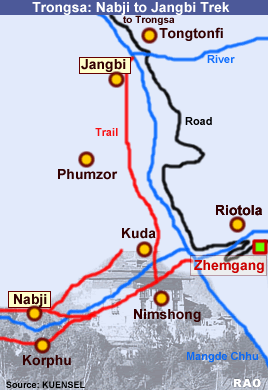 |
| According
to tour operators the locals can run lodges, have campsites within the
villages, provide horses for the tourists and also work as guides since
they would be more familiar with the ecosystem of the place. |
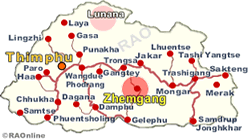 |
| The
new route will also address the seasonality problem, as they are best suited
for trekking between November and April, the lean tourist season.
Inaugurating
the trail, the agriculture minister, Lyonpo Sangay Ngedup said apart from
all that, the trail was an attraction to tourists and Bhutanese people
alike to visit historical places witness the culture and luxuriate in the
area's unblemished natural environment. |
|
top
|
Nabji
Trail - An example of sustainable rural tourism development
|

|
Community
tourism in Jigme Singye Wangchuck National Park
A
team of DOT, NCD, ABTO and SNV staff decided to explore the possibility
of community-operated trekking trails that would provide additional income
for local communities residing in the Jigme Singye Wangchuck National
Park (JSWPN) (Bhutan's protected areas),
which is located in one of the poorest districts in Bhutan. More than 90
per cent of the inhabitants of some villages inside the park lack self-sufficiency
in cereals, and their location inside a national park limits their opportunities
for earning cash income.
The
highlights of the Nabji trekking trail include visits to small Bhutanese
mountain villages and the Monpa
ethnic group, diverse forests of the park, and possible sightings
of endangered and vulnerable species such as the golden
langur and rufous-necked hornbill.
| Community
tourism |
Jigme
Singye Wangchuck National Park: Nabji Trail |
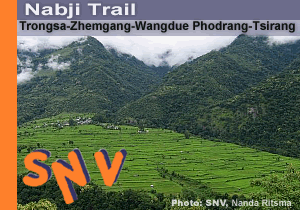 |
 |
The
village communities along the trekking trail, namely the villages of Nimshong,
Nabji, Korphu, Kupdra/Phrumzor and Jangbi, have expressed enthusiasm
for the project and agreed to establish tourism management committees to
plan and manage sustainable tourism development.
top
|
Average
Income of Bhutanese People
|

|
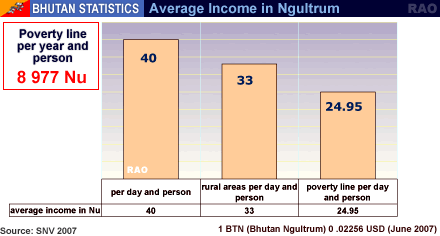 |
| The
average income per person per day in Bhutan is Ngultrum (Nu) 40, which
is less than a dollar a day, and the average income in rural areas is even
lower at Nu 33 per day (77 cents). The poverty line is about Nu 748.10
per person per month, which translates to $17.40 USD per month and $208.75
USD per year .
More
than one third of the population lives below this poverty line . |
|
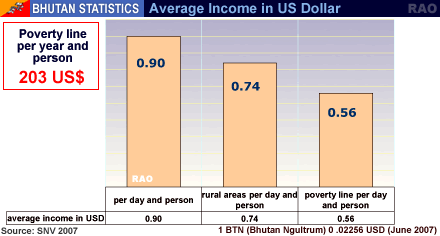 |
| According
to law, all tourists must book their travel with a tour operator registered
with the government of Bhutan. The Department of Tourism has set minimum
tariffs for tourists of $200 USD per night during the high season. All expenses, like accommodation, transport, guide
services, entrance fees, etc. are included in this amount. Tourists only
pay extra for their drinks and souvenirs. |
|
Out
of the $200 USD, about $70 USD are royalties and taxes (among others, the
Royal Government of Bhutan is using these revenues to provide free health
care and education, also benefiting poor); the rest remains with the tour
operator to develop the daily package.
For
more information on Community tourism
along the Nabji Trail in the Jigme Singye Wangchuck National Park - An
example of sustainable rural tourism development in Bhutan:
Please
visit SNV Bhutan's website SNV
Bhutan SNV
Bhutan
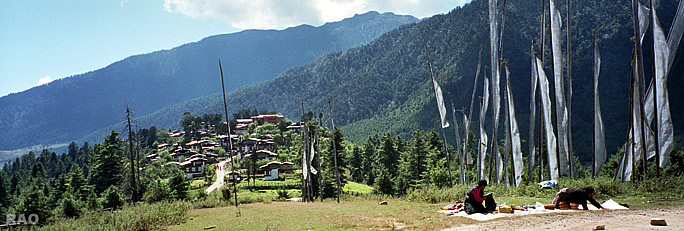
|
|
Phobjikha
valley
|
| Information on Bhutan |
 |
 |
 |
External
links |
 |
|
Netherlands
Development Organisation
|
|
|








![]() SNV
Bhutan
SNV
Bhutan

